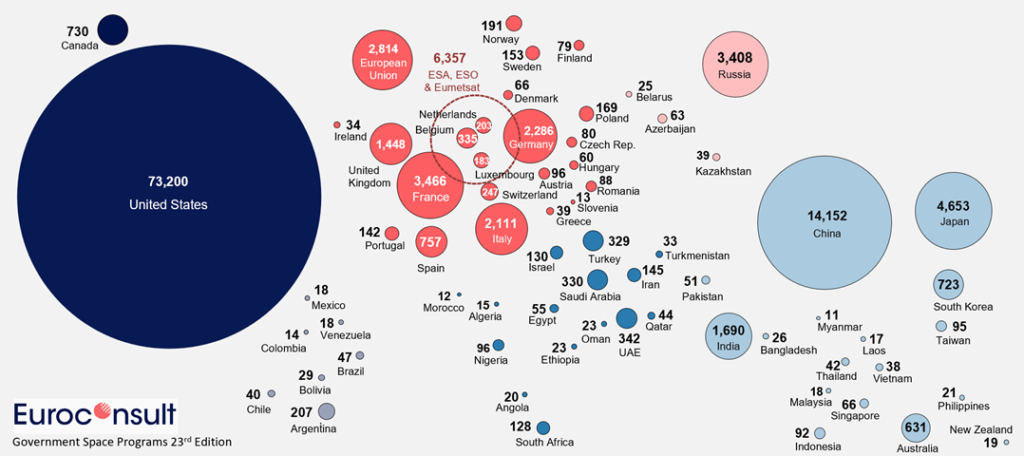Euroconsult has released its annual, and 23rd, deep dive into government spending on space programs with spending reaching record levels and defence expenditures driving growth.
According to the report, government expenditures on space programs increased to USD $117 billion, a 15% increase compared to the previous year.

Defense expenditures now take the lead
For better or worse, Euroconsult says that defense expenditures are taking the lead.
“Throughout history, government spending has predominantly been directed towards investments in civil space activities. However, in 2023, a significant paradigm shift has occurred, with defense expenditures now taking the lead. This development underscores the pivotal role of space in an era characterized by escalating global tensions. The increasingly complex and contentious geopolitical landscape has motivated leading spacefaring nations to intensify their investments in the defense space sector. While funding for traditional applications like Telecommunications, Navigation, and Earth observation has steadily increased in recent years, the most notable surge has been witnessed in investments related to Security and Early Warning.”
The U.S. led Artemis program, China IRLS lead civil spending
Not surprisingly the U.S. led Artemis program and China’s International Lunar Research Station initiative is in part driving growth in civil space programs. As well, several new nations are entering the picture. The report includes the addition of the following countries: Armenia, Djibouti, Albania, Cyprus. As well, Euroconsult said it had added a “new benchmarking tool related to the impact of exchange rates on the budgets of countries.”
“On the other side, the growth in civil budgets is mainly driven by crewed and non-crewed Scientific and Exploration programs. While spending remains concentrated among leading spacefaring nations, notably supporting the U.S.-led Artemis program and the Chinese IRLS initiative, an increasing number of nations are acknowledging the socio-economic benefits of these endeavors and are now developing their own initiatives.”
Euroconsult provided some teaser data saying that “In terms of national rankings, the U.S. continues to hold the top position in governmental investment in space, allocating over $73 billion to space activities in 2023. However, its global share has gradually decreased from around 75% in 2000 to 63% in 2023, as other nations have increased their financial efforts in the sector. While Europe has maintained consistent importance, Asia’s share of global spending has nearly doubled since the early 2000s, driven by China’s substantial investments in the sector.”
Canada’s spending was pegged at $730M. A sampling of some other nations shows significant growth with Australia at $631M, South Korea $723M, Spain at $757M, the U.K. $1.45B and India $1.69B.
The full report and data are available starting at €8,000.
 SpaceQ Space news and analysis.
SpaceQ Space news and analysis.



